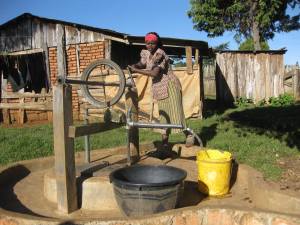The 4th event of this biannual world meeting of food communities is organised by Slow Food (since 2004) and brings together over 5,000 representatives of small scale farmers, producers, cooks, educators, youth and activists from 160 countries to collaboratively work together on improving our food system.
Terra Madre,(Mother Earth) will be held October 21-25,2010 together with Salone del Gusto (Ark of Taste) in Turin italy. These two biennial events, though different in character, have by now become two inseparable and interconnected halves, in constant dialog with each other.
Salone del Gusto/Terra Madre offers perhaps the only place in the world where artisan producers, academics and chefs, wine connoisseurs and novice food lovers come together in a spirit of exchange and friendship.
47 Kenyans, led by Samuel Muhunyu, are putting final touches to their preparations to participate in Terra Madre 2010 and the team includes Slow Food members and Terra Madre food communities. They hail from different parts of Kenya: Nairobi,Kiambu, kwale, Machakos, Makueni, Meru,Busia, Kitale, Bungoma, west pokot,Thika, Nakuru, Kisumu, Marsabet etc and they include farmers,producers,chefs, academics, youth, students, and journalists. They will be attending the Terra Madre and Salone del Gusto event from the 20th -25th October, 2010 to showcase their indigenous products, diverse cultures,interact and share with other food communities on issues related to food and more. Not only is Salone del Gusto/Terra Madre a tasty and satisfying experience, it also provides an educational exploration and deeper engagement with food production process.
These two aspects of the fair meet with the Earth workshops, Taste Workshops and Theatres of Taste. Producers, experts and great chefs guide the visitors in an experience that speaks to the senses as well as to the mind. This year’s program of the Salone is a sophisticated blend of pleasure and awareness, two cornerstones in the history of the Slow Food association: sought-after tastings of the highest quality, the presence of legendary personalities, spaces dedicated to the Terra Madre food communities and the presidia and above all, the integrity of the principles of good, clean and fair food.
Food products that are at risk of extinction or rarely utilized in our cuisines and are within the international Presidia will be showcased, including Kenyan products Stinging Nettle from Utugi Self Help Group and Lare traditional Pumpkin from Nganoini Self Help Group. As part of the Slow Food movement’s work on food waste, Salone del Gusto will be hosting its first Dinner of Leftovers. When the doors of the Salone 2010 close on Monday, October 25, a group of chefs from Michelin-starred restaurants as well as humble osterias, will use all the creativity and technical know-how at their disposal to create a meal using the ingredients leftovers from the kitchens of the Theatres of Taste and the Taste Workshops, as well as products from the Italian and international Presidia and the Earth Markets that cannot be kept or brought back home.
The international Presidia projects aim to protect unique regions and ecosystems, recover traditional food processing methods and safeguard native breeds and local plant varieties.
To participate in forums discussing various Earth Workshops click on the following link; <http://www.terramadre.org/pagine/incontri/welcome.lasso?id=C2744B8813d3a172DBrKX4144CA2&ln=en>


 This training document is from
This training document is from 




